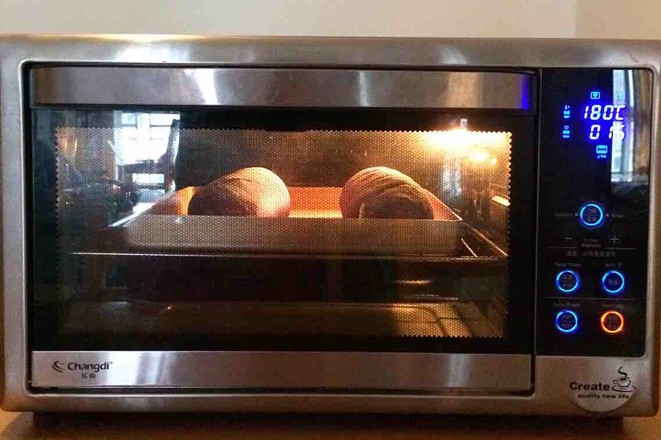Whole Wheat Nut Mochi Ou Bun
1.
Take 15 grams of butterfly pea flowers and soak them in 200 grams of boiling water.
2.
After the soaked butterfly pea flower water is cooled, filter it with a sieve and squeeze the soaked butterfly pea flower. The higher the concentration of the juice, the better, and then take 150 grams of butterfly pea flower water for use. (If the temperature is high in summer, you can put the butterfly pea flower water in the refrigerator before use)
3.
Add butterfly pea flower water, caster sugar and salt diagonally into the bucket of the bread machine, then pour in the whole wheat flour and high-gluten flour, finally dig a hole in the flour, add yeast powder (materials other than butter, according to the first The order of the powder after the liquid), start the bread machine and dough program.
4.
After 15 minutes, the dough is formed, add butter, and continue to start the dough kneading program for 20 minutes.
5.
Knead until the dough is in the expansion stage, and the film can be pulled out.
6.
Arrange the dough and put it in the bread machine barrel for fermentation.
7.
Make mochi while the dough is fermenting. Mix the mochi ingredients except butter and mix well.
8.
Steam it on the pot for about 10 minutes, and the surface is solidified and there is no liquid.
9.
Take out the steamed mochi, let it cool, add butter, and rub the butter into the mochi with your hands.
10.
After kneading thoroughly, divide into two equal parts, cover with plastic wrap and set aside.
11.
When the dough is 2~2.5 times as big, dip your fingers in flour and poke holes so that it does not collapse or rebound.
12.
Take out the dough and ventilate, divide it into two equal parts, round and relax for 15 minutes, remember to cover with plastic wrap.
13.
Take a loose piece of dough, flatten it with your hands, roll out the dough with a rolling pin, turn it over and roll it over again, arrange it into a rectangle with your hands, and thin the bottom edge. Take a portion of mochi and use a rolling pin to roll it into a rectangle smaller than the dough.
14.
Spread the rolled mochi chips on the noodles, put the chopped walnuts, almonds, pistachios, raisins and almonds, and then gently press down.
15.
Roll up from top to bottom.
16.
Pinch the cuff of the dough tightly.
17.
Put it on a non-baking tray with the mouth down.
18.
Put it in the oven for secondary fermentation, turn on the oven fermentation function, set the fermentation temperature to 35 degrees, remember to put a bowl of warm water on the bottom of the oven to increase the humidity.
19.
Take out the bread when it is twice as large, sift a thin layer of high-gluten flour on the surface, and scrape the texture on the surface of the bread with a sharp blade.
20.
Put it in the middle of the preheated oven and heat it up and down at 180 degrees for about 15 minutes. (The tin foil can be covered after the surface of the bread is colored to prevent the color from baking)


Tips:
1. Please adjust the amount of water according to the absorbency of the flour you choose.
2. When steaming the mochi, I covered it with plastic wrap. You can leave it without the plastic wrap, so that the steamed mochi will be slightly wet and sticky, and the taste will be softer. If the mochi is wet and soft, you can just spread the mochi with your hands. You don’t need to roll it out on the dough. When making mochi, it is recommended to wear gloves to prevent sticking to your hands.
3. Cooked walnuts are used in the recipe. If it is raw walnuts, you can peel the walnuts and heat them in the microwave for 2 minutes, then let them cool, rub the skins and break them into small pieces, or use the oven for baking. 150°C for about 11~13 minutes (please adjust the specific temperature and time according to the actual situation of the respective oven). Observe the oil on the surface of the walnut kernels slowly seeping out. Do not roast too much, it will have a bitter taste.
4. For the filling, you can choose other nuts or preserved fruits according to your own preferences, the number of grams can be more or less, not necessarily according to the exact number of grams in the recipe.